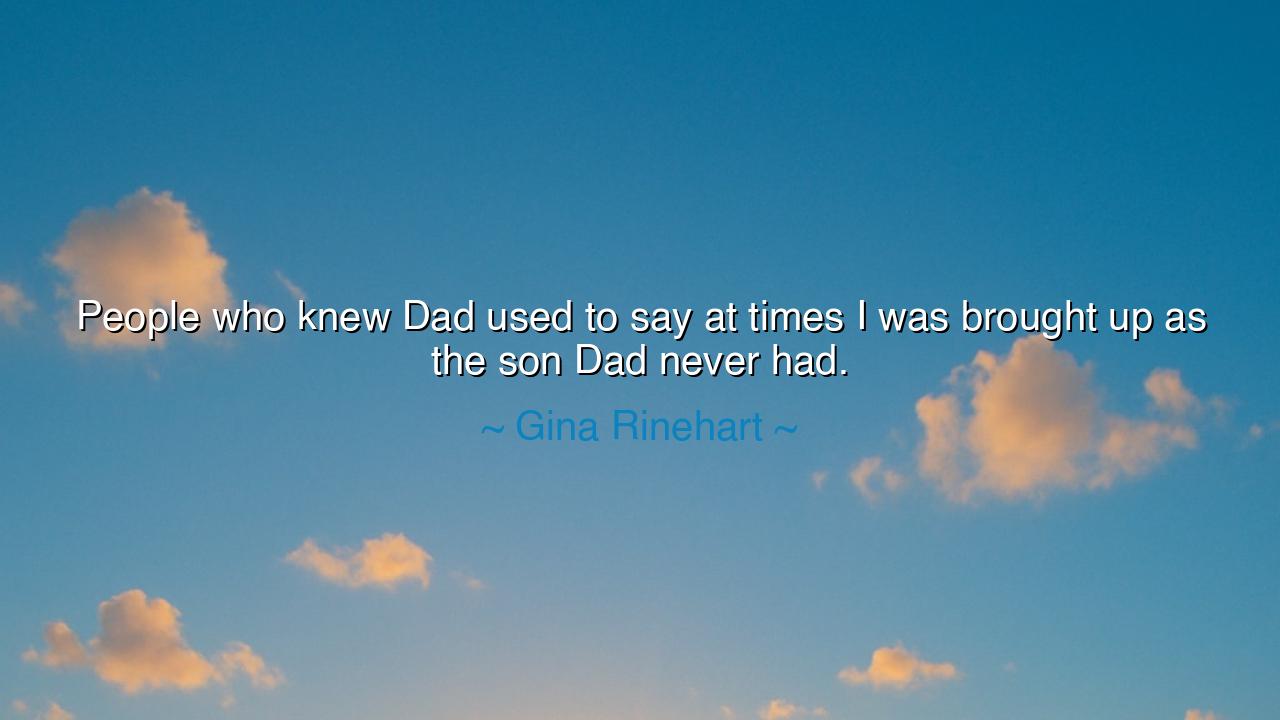
People who knew Dad used to say at times I was brought up as the






“People who knew Dad used to say at times I was brought up as the son Dad never had.” Thus spoke Gina Rinehart, heiress, magnate, and bearer of a legacy both mighty and heavy. In these words there echoes not merely the memory of a father and a daughter, but the story of expectation, identity, and the eternal dance between inheritance and individuality. Beneath the simplicity of the phrase lies a truth as old as lineage itself—that when destiny calls through blood, one must sometimes take upon oneself a mantle that tradition never imagined.
In the ancient world, such a statement would have been spoken with reverence and solemn pride. For among the elders and sages, to be regarded as the son one’s father never had was not a slight, but an honor—a recognition that strength, courage, and wisdom transcend the boundaries of gender or birth. In this, Gina Rinehart joins the company of those rare souls who stepped beyond what the world expected and fulfilled what fate required. Her father, Lang Hancock, was a titan of industry, a pioneer who saw mountains not as obstacles but as vaults of treasure. To be raised beneath such a shadow meant more than privilege—it meant duty, the call to continue a vision born before one’s own breath.
History, too, holds its mirrors to this truth. Consider the story of Queen Hatshepsut of Egypt, who, when her father Thutmose I passed, was not content to rule as regent but ascended the throne as Pharaoh in her own right. She donned the royal beard and the regalia of kings, for her people could not yet imagine a woman as the bearer of divine kingship. Yet she ruled wisely and built monuments that still defy time. Like Gina, she was seen by her people as the “son the king never had,” yet she proved that leadership has no gender, and that greatness answers to will, not to form.
So too, in Gina Rinehart’s words, we hear the echo of generations who carried burdens not their own—but made them their own through courage and endurance. To be raised as “the son her father never had” is to live under dual light: one of honor, the other of expectation. For it means inheriting not only wealth or name, but the weight of a dream unfinished. It is to be molded not by ease but by challenge, to learn strength where others might find shelter, and to forge one’s identity in the fire of a father’s vision.
And yet, hidden in these words lies not pride alone, but loneliness. For when one is raised to embody another’s ideal—to fill a void that was never meant for them—there comes the silent struggle of becoming one’s own self within the armor of inheritance. The ancients knew this conflict well. The Greek hero Achilles was destined by prophecy to surpass his father, yet to do so meant to die young. Thus, every child who follows a great parent walks between two fires—the flame of admiration and the flame of self-discovery. Gina’s words carry that same tension, the bittersweet truth that love and expectation are sometimes one and the same.
But from this tension arises greatness. For to embrace another’s dream and transform it through one’s own soul is the highest form of creation. Gina Rinehart did not merely preserve her father’s empire—she expanded it, reshaping his legacy through her own will and labor. Her life, like those of the ancient heroines, teaches that destiny does not always arrive in the form we expect; it often comes as a challenge to redefine what strength and leadership mean. The daughter who was raised as a son becomes, in time, something even greater—a symbol of transformation, of power born from love, of continuity through change.
Thus, let this truth be passed down: inheritance is not a matter of blood, but of spirit. When you are called to carry forward the vision of those who came before, do not ask whether you were meant to, or whether the world approves. Ask only whether the fire that burned in them still burns in you. And if it does, then rise—rise as the child of your own making, the heir not of a name, but of a dream.
For in the end, to be called “the son your father never had” is not to live in another’s shadow, but to become the light that completes what they began. And in that light, the bond between generations becomes eternal—a lineage not of flesh, but of purpose, carried forward by those bold enough to answer the call.






AAdministratorAdministrator
Welcome, honored guests. Please leave a comment, we will respond soon